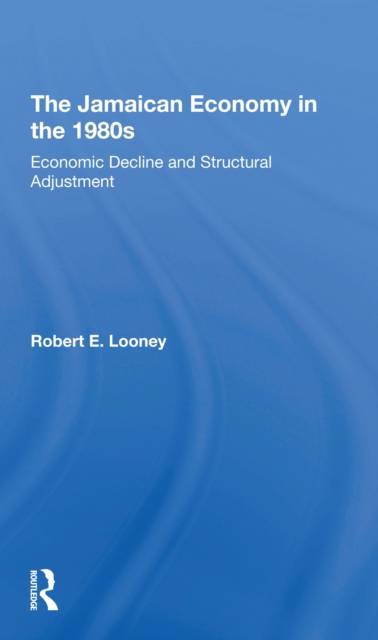
- Afhalen na 1 uur in een winkel met voorraad
- Gratis thuislevering in België vanaf € 30
- Ruim aanbod met 7 miljoen producten
- Afhalen na 1 uur in een winkel met voorraad
- Gratis thuislevering in België vanaf € 30
- Ruim aanbod met 7 miljoen producten
Zoeken
The Jamaican Economy in the 1980s
Economic Decline and Structural Adjustment
Robert E Looney
Paperback | Engels
€ 56,95
+ 113 punten
Uitvoering
Omschrijving
This book analyzes the main causes of deterioration in the Jamaican economy since 1972 and assesses the prospects for returning to a period of stable growth under an International Monetary Fund Stabilization program. Considering both the role of international economic conditions and domestic policies on Jamaica's economic decline, Dr. Looney compares the viability of the socialist model of development, implemented between 1972 and 1980, with that of the U.S.-sponsored supply side model. He raises important questions about the ability of small open economies to sustain acceptable rates of growth in the existing world economic environment, the effectiveness of IMF Stabilization programs on these economies, the possible impact of supply side development strategies, and the significance of Caribbean Basin Initiative policies for growth and stability in the area.
Specificaties
Betrokkenen
- Auteur(s):
- Uitgeverij:
Inhoud
- Aantal bladzijden:
- 257
- Taal:
- Engels
Eigenschappen
- Productcode (EAN):
- 9780367308773
- Verschijningsdatum:
- 31/05/2021
- Uitvoering:
- Paperback
- Formaat:
- Trade paperback (VS)
- Afmetingen:
- 150 mm x 241 mm
- Gewicht:
- 385 g

Alleen bij Standaard Boekhandel
+ 113 punten op je klantenkaart van Standaard Boekhandel
Beoordelingen
We publiceren alleen reviews die voldoen aan de voorwaarden voor reviews. Bekijk onze voorwaarden voor reviews.











